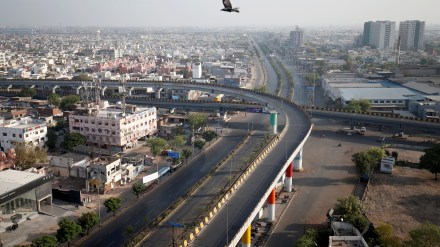– By Varun Gada
India’s warehousing industry is undergoing a seismic shift, propelled by the twin engines of industry and infrastructure growth. Further, as India approaches the 2024 elections, the country is witnessing a surge of transformative infrastructure projects aimed at revolutionizing connectivity and bolstering economic growth, thereby also providing a massive push for accelerated growth for 3PL and warehousing sectors.
According to a recent report, the Indian warehousing market witnessed significant growth H1 2023, marked by a 35% YoY increase in total space take-up, reaching an impressive 19.1 million sq. ft. The 3PL (Third-Party Logistics) players continued to be the driving force, contributing to about 43% of leasing activity, YoY. With the government focus on positioning India as a global manufacturing and logistics hub, several polices have been recently implemented, attracting estimated $10 billion USD investments in the warehousing and logistics sector. These developments, coupled with India’s ambitious infrastructure agenda for 2024, is set to propel India towards becoming a global logistics hub.
Key Mega Infrastructure Hubs that will drive 3PL and logistic sector
The inauguration of transformative infrastructure projects ahead of the 2024 elections in India signifies a paradigm shift in the country’s development trajectory. With initiatives such as the Mumbai Trans Harbour Link (MTHL), Navi Mumbai International Airport, Noida International Airport, Western Dedicated Freight Corridor, and Bengaluru-Chennai Expressway gaining momentum, India is poised to unlock new avenues for economic growth. Coupled with positive policy support, the completion of these key infrastructure projects is poised to revolutionize India’s industrial landscape, particularly in sectors such as manufacturing, attract international businesses, and propel the warehousing and logistics sector to new heights.
Mumbai Trans Harbour Link (MTHL):
The recently inaugurated Mumbai Trans Harbour Link (MTHL), spanning 22 kilometres, is India’s longest sea bridge, and is designed to facilitate smoother traffic flow, spur economic activity in Navi Mumbai, and lay the groundwork for enhanced logistics operations in the region.
Navi Mumbai International Airport:
In tandem with the MTHL, the Navi Mumbai International Airport is slated for Phase 1 completion by 2024, and will be catering to 20 million passengers annually. As a key gateway to western India, the airport will alleviate congestion at existing airports, foster international trade, and bolster cargo handling capabilities, thus strengthening India’s logistics infrastructure.
Noida International Airport:
Located in the National Capital Region (NCR), the Noida International Airport is anticipated to be operational by 2024, and will serve as a vital hub for trade and commerce, facilitating smoother movement of goods and passengers, fostering regional development and infrastructure expansion.
Western Dedicated Freight Corridor:
The Western Dedicated Freight Corridor (WDFC) is designed to enhance freight transportation efficiency between Delhi and Mumbai. Scheduled for completion before the 2024 elections, this dedicated corridor offers state-of-the-art infrastructure and advanced signalling systems that will foster economic growth along the route, while also facilitating seamless movement of goods, reducing transit times and costs for businesses.
Bengaluru-Chennai Expressway:
The Bengaluru-Chennai Expressway is set to emerge as a lifeline for trade and commerce between two of India’s major economic hubs. With construction progressing rapidly, this expressway is expected to enhance connectivity and accessibility between Chennai and Bangalore, while unlocking new avenues for economic development, attracting investment and bolstering logistics infrastructure along its corridor.
Impact on Business and Trade
India’s commitment to infrastructure development serves as a powerful magnet for international businesses seeking investment opportunities in the country. The establishment of world-class transportation hubs that help enhance India’s connectivity with global markets, make it an attractive destination for multinational corporations looking to expand their operations. Further, the modernization of transportation infrastructure, favourable government policies, access to India’s vat consumer market, and skilled workforce coupled with conducive environment for foreign direct investment (FDI), makes India a lucrative base for International businesses looking to explore opportunities in manufacturing, research and development, and service-oriented industries.
Stimulating Growth of 3PL and Warehousing Sector:
The burgeoning infrastructure landscape in India is poised to fuel the growth of the third-party logistics (3PL) and warehousing sector. As industries expand and supply chains become more complex, there is a growing demand for specialized logistics services and modern warehousing facilities.
The development of dedicated freight corridors and expressways will optimize freight movement, enabling 3PL providers to offer more efficient and cost-effective logistics solutions to their clients. Additionally, the proximity to major transportation hubs such as airports and seaports will enable faster distribution of goods, reducing lead times and enhancing customer satisfaction.
Furthermore, the influx of international businesses and the expansion of domestic industries will drive demand for advanced warehousing infrastructure. This presents opportunities for investment in state-of-the-art warehouses equipped with automation, robotics, and digital technologies to optimize storage and inventory management processes while also creating solutions that are aligned with global standards of sustainability, transparency, and safety.
Way forward
As India embarks on a journey of infrastructure transformation, the impact on industry growth, attraction of international businesses, and stimulation of the 3PL and warehousing sector cannot be overstated. By enhancing connectivity, reducing logistical bottlenecks, and fostering a conducive business environment, these key infrastructure projects lay the foundation for sustainable economic development and position India as a preferred destination for investment and growth in the global marketplace.
(Varun Gada is the Director of LP Logiscience – A Liladhar Pasoo Company.)
(Disclaimer: Views expressed are personal and do not reflect the official position or policy of Financial Express Online. Reproducing this content without permission is prohibited.)
